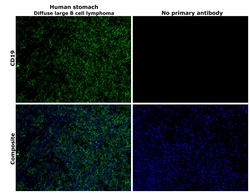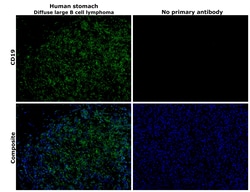Learn More
Invitrogen™ CD19 Monoclonal Antibody (6OMP31), eBioscience™, Invitrogen™
Rat Monoclonal Antibody
Supplier: Invitrogen™ 14019437

Description
The 6OMP31 MAb reacts with human, mouse, and rat CD19. CD19 is a transmembrane glycoprotein belonging to the immunoglobulin superfamily. CD19 was first identified as the B4 antigen of human B lymphocytes using the anti-B4 monoclonal. It is expressed by B cells during all stages of development, except on terminally differentiated plasma cells, and on follicular dendritic cells. CD19 acts primarily as a B cell co-receptor and together with CD21, CD81, Leu13, and MHC class II forms a multi-molecular complex that associates with the BCR. CD19 plays a role in the development, activation, differentiation, and proliferation of B cells. CD19 deficiency leads to an overall impaired humoral immune response. Mutations in CD19 have been associated with severe immunodeficiency syndromes. Although it is unclear whether CD19 contributes directly to B cell carcinogenesis, it is expressed on most B cell tumors, such as acute lymphoblastic leukemias and B cell lymphomas. The use of CD19 monoclonal antibodies for therapies against lymphoma, leukemia and autoimmune disorders are currently being explored.
CD19 is a member of the immunoglobulin superfamily and has two Ig like domains. The CD19 molecule is expressed on 100% of the peripheral B cells as defined by expression of kappa or lambda light chains. CD19 appears to be expressed on myeloid leukemia cells, particularly those of monocytic lineage. Leukemia phenotype studies have demonstrated that the earliest and broadest B cell restricted antigen is the CD19 antigen. The receptor for CD19 is an important functional regulator of normal and malignant B cell proliferation, and is expressed in all B cell precursor leukemias. Lymphocytes proliferate and differentiate in response to various concentrations of different antigens. The ability of the B cell to respond in a specific, yet sensitive manner to the various antigens is achieved with the use of low-affinity antigen receptors. CD19 is a cell surface molecule which assembles with the antigen receptor of B lymphocytes in order to decrease the threshold for antigen receptor-dependent stimulation. Besides being a signal-amplifying coreceptor for the B cell receptor (BCR), CD19 can also signal independently of BCR co-ligation and is a central regulatory component upon which multiple signaling pathways converge. Mutation of the CD19 gene results in hypogammaglobulinemia, whereas CD19 overexpression causes B cell hyperactivity.
Specifications
| CD19 | |
| Monoclonal | |
| 0.5 mg/mL | |
| PBS with 0.09% sodium azide; pH 7.2 | |
| P15391, P25918 | |
| Cd19 | |
| E. coli fragment (aa 314-556) of the cytoplasmic domain. | |
| 2 mg | |
| Primary | |
| Human, Mouse, Rat | |
| Antibody | |
| IgG2a κ |
| Immunohistochemistry (Frozen), Immunohistochemistry (Paraffin), Western Blot, Immunocytochemistry | |
| 6OMP31 | |
| Unconjugated | |
| Cd19 | |
| AW495831; B4; B-lymphocyte antigen CD19; B-lymphocyte surface antigen B4; Cd19; CD19 antigen; CD19 molecule; CVID3; differentiation antigen CD19; Leu-12; T-cell surface antigen Leu-12 | |
| Rat | |
| Affinity chromatography | |
| RUO | |
| 12478, 365367, 930 | |
| 4°C | |
| Liquid |
The Fisher Scientific Encompass Program offers items which are not part of our distribution portfolio. These products typically do not have pictures or detailed descriptions. However, we are committed to improving your shopping experience. Please use the form below to provide feedback related to the content on this product.









